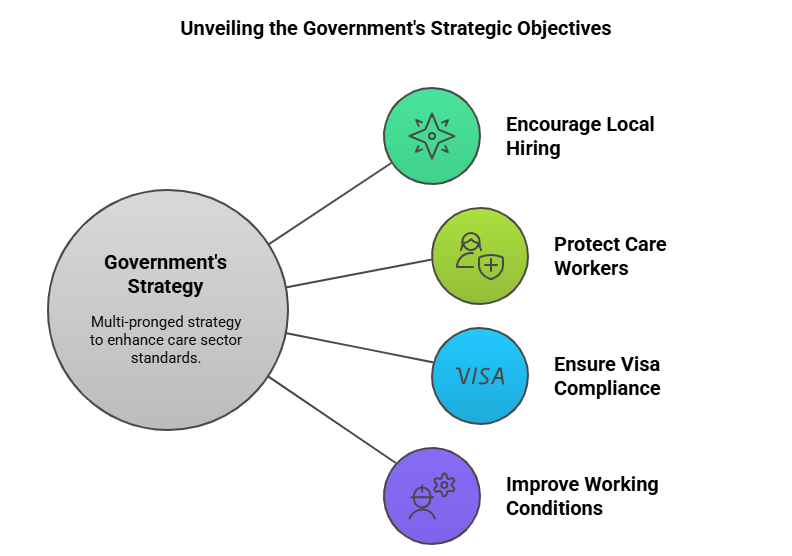UK Targets Local Hiring for Care Roles

In a decisive move to reform the adult social care sector, the UK government implemented immigration changes in April 2025 that prioritize the hiring of care workers already residing in England. These changes mark a major policy shift to cut overseas labor reliance, boost workforce stability, and prevent worker exploitation.
In recent years, adult social care has struggled with staff shortages, overreliance on foreign workers, and exploitation. New reforms aim to create a more ethical, sustainable, and locally focused system.
Why the Changes Were Introduced
The government’s strategy is multi-pronged:
- Encourage local hiring and reduce dependence on international labor.
- Protect care workers from unethical recruitment practices and exploitation.
- Ensure visa compliance and improve job stability for those already in the UK.
- Improve working conditions and compensation standards in the care sector.

This marks a turning point in how the UK approaches health and social care workforce planning, shifting away from rapid overseas recruitment toward professionalizing the field and investing in home-grown talent.
Local Recruitment Now a Legal Priority
Under the new rules, employers in England must demonstrate that they have made a genuine attempt to recruit care workers from within the UK before seeking international candidates. This includes:
- Advertising jobs locally.
- Collaborating with regional or sub-regional partnerships to identify available talent.
- Keeping records that prove unsuccessful efforts to fill roles with domestic candidates.
|
🔹 These rules apply specifically to: Care Workers (SOC code 6135) Senior Care Workers (SOC code 6136) |
🔸 Not applicable to: Nursing Assistants (SOC 6131) Jobs in Scotland, Wales, or Northern Ireland |
The goal is to provide fair opportunities for UK-based workers, including displaced foreign nationals already residing in the country, particularly those who may have lost employment due to sponsor license revocations or expired visas.
Sponsor License Revocations and Worker Protections
The emphasis on local recruitment comes amid a crackdown on non compliant employers. Since July 2022, more than 470 sponsor licenses have been revoked due to breaches such as illegal wage deductions, charging recruitment fees, or poor working conditions.
Many overseas workers previously faced the risk of deportation if their sponsor lost its license. Now, the updated rules allow these individuals—if already in the UK—to be prioritized for re-employment with new care providers. This ensures continuity of employment and safeguards against further exploitation.
Updated Salary Thresholds in UK
In line with the NHS Agenda for Change pay scales, the government has increased the minimum salary thresholds for care workers and senior care workers under the Skilled Worker and Health and Care Visa routes.
Key points include:
- Employers cannot include immigration fees, recruitment agency charges, or similar deductions when calculating salary.
- The reforms ensure that take-home pay reflects the essential and demanding nature of care work.
- The new pay structures aim to reduce wage suppression and support sector-wide professionalization.
This change is designed to attract more UK-based candidates to the profession by offering clearer career paths and fairer wages.
Exemptions from Local Recruitment Requirements
Not all care workers are subject to the new recruitment rules. Exemptions include:
- Workers already legally sponsored in England.
- Care workers switching visa routes who have been employed by the same sponsor for at least three months.
These exemptions help provide stability for those who are already part of the care workforce and allow smoother transitions between roles and visa categories.
Impacts on Key Stakeholders
The UK's updated hiring rules in the care sector have brought substantial changes for all involved. These reforms affect how employers recruit, how current UK-based care workers are retained, and how overseas applicants are evaluated.
👩⚕️ For Employers
- Employers must now prioritize hiring care workers already residing in the UK before seeking talent from abroad.
- They are required to document and demonstrate genuine local recruitment efforts, such as job advertisements and collaboration with regional employment networks.
- Full compliance with sponsorship and salary regulations is mandatory. Any failure to meet these conditions may lead to serious consequences, including financial penalties or revocation of their sponsor license.
- Employers must ensure salaries exclude immigration-related fees or deductions and align with official NHS pay scales.
👨⚕️ For Care Workers Already in the UK
- These policy changes offer significant advantages for international care workers who are already legally residing in the UK.
- Those who have lost their jobs due to sponsor license issues or are transitioning between visa types now have improved prospects for re-employment.
- Workers with at least three months of experience with their current care provider may switch roles without being affected by the new local recruitment requirement.
- The reforms aim to provide more job stability and reduce the risk of exploitation for workers already in the system.
🌍 For Overseas Applicants
- While the door is not entirely closed, the pathway for new overseas care workers has become more restricted.
- Employers must provide evidence of unsuccessful domestic recruitment efforts before extending sponsorship offers to international applicants.
- Applicants must still meet all visa eligibility requirements, including the revised salary threshold and ethical recruitment standards.
- The focus is on quality over quantity, with a more cautious approach to international hiring aimed at protecting both workers and the integrity of the system.
Concerns from the Sector
While many welcome the crackdown on unethical practices, some care providers and unions have expressed concern about the potential for staff shortages. Over recent years, nearly half of new care workers in England were recruited from abroad due to an insufficient domestic workforce.
Sector leaders have urged the government to back the immigration changes with robust support for local recruitment, including:
- Funding for training and upskilling programs.
- Better working conditions and career progression paths.
- Increased public awareness of care work as a viable and respected profession.
Without these supports, some fear that reduced international hiring could lead to service gaps, especially in elderly care and disability support services.
Building a Fairer and More Sustainable Future
The April 2025 reforms reflect a broader ambition to build a resilient, ethical, and professional care sector. By prioritizing domestic recruitment, enhancing worker protections, and aligning compensation with industry standards, the government is aiming to make care work a more attractive and stable career choice.
While overseas recruitment remains an option, it is now clearly positioned as a secondary route, accessible only when domestic recruitment efforts are exhausted.
Conclusion
England’s prioritization of UK-based care worker hiring marks a profound shift in immigration and labor policy. By holding employers to higher standards and offering displaced or underemployed workers within the country a second chance, the government aims to address long-standing issues in the care sector. The success of these efforts, however, will depend heavily on continued investment in local workforce development and close monitoring to ensure fair treatment for all care workers—regardless of their origin.
Steps to Secure Your eTA for the United Kingdom
- Step1: Complete the online application form by entering your passport details and required personal information.
- Step2: Make the payment securely online using a credit or debit card.
- Step3: Check your email for the payment confirmation and receive your eTA electronically.